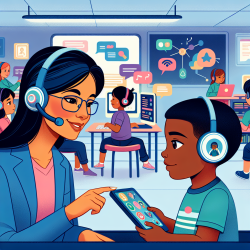Introduction
In today's educational landscape, online therapy services have emerged as a vital component in supporting students with special needs. As a Special Education Director, understanding the intricacies of online therapy can significantly enhance your ability to provide effective leadership and ensure compliance with legal standards. This blog post explores key insights from recent research on online therapy, offering practical tips for practitioners seeking to improve their skills and encourage further research.
The Growing Need for Online Therapy
The demand for online therapy services has surged, particularly in the wake of the COVID-19 pandemic. School districts across the globe have turned to companies like TinyEYE to bridge the gap caused by therapist staffing shortages. Online therapy offers a flexible and accessible solution, enabling students to receive the support they need without the constraints of geographical boundaries.
Key Insights from Recent Research
Recent research highlights several critical outcomes of implementing online therapy in schools:
- Accessibility: Online therapy breaks down geographical barriers, providing access to specialized services for students in remote or underserved areas.
- Flexibility: The virtual format allows for more flexible scheduling, accommodating the diverse needs of students and their families.
- Cost-Effectiveness: By reducing the need for physical space and travel, online therapy can be a more cost-effective solution for school districts.
- Data-Driven Insights: Online platforms often come equipped with tools for tracking progress and outcomes, offering valuable data to inform individualized education plans (IEPs).
Practical Tips for Practitioners
To maximize the benefits of online therapy, practitioners should consider the following strategies:
- Embrace Technology: Familiarize yourself with the latest online therapy platforms and tools. Attend webinars and training sessions to stay updated on technological advancements.
- Foster Collaboration: Encourage collaboration between therapists, educators, and families to create a holistic support system for students.
- Prioritize Communication: Maintain open lines of communication with all stakeholders, ensuring that everyone is informed and involved in the therapy process.
- Focus on Legal Compliance: Stay informed about legal requirements related to online therapy, such as data privacy and security regulations.
Encouraging Further Research
While the benefits of online therapy are evident, there is still much to learn about its long-term impact on student outcomes. Practitioners are encouraged to engage in further research to explore areas such as:
- The effectiveness of online therapy compared to traditional in-person services.
- The impact of online therapy on student engagement and motivation.
- Strategies for integrating online therapy into existing special education frameworks.
Conclusion
As a Special Education Director, your role in leading the integration of online therapy services is crucial. By staying informed about the latest research and implementing best practices, you can ensure that your school district provides high-quality support to students with special needs. To read the original research paper, please follow this link: D.










